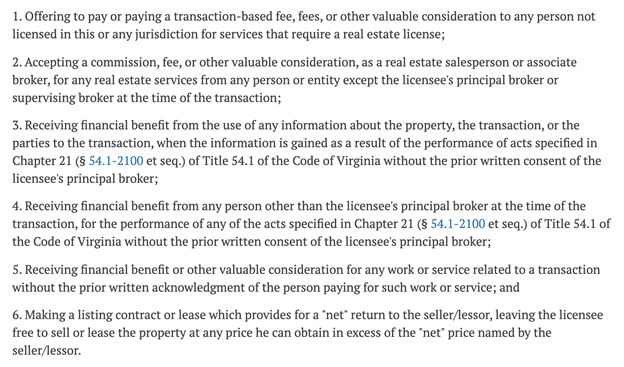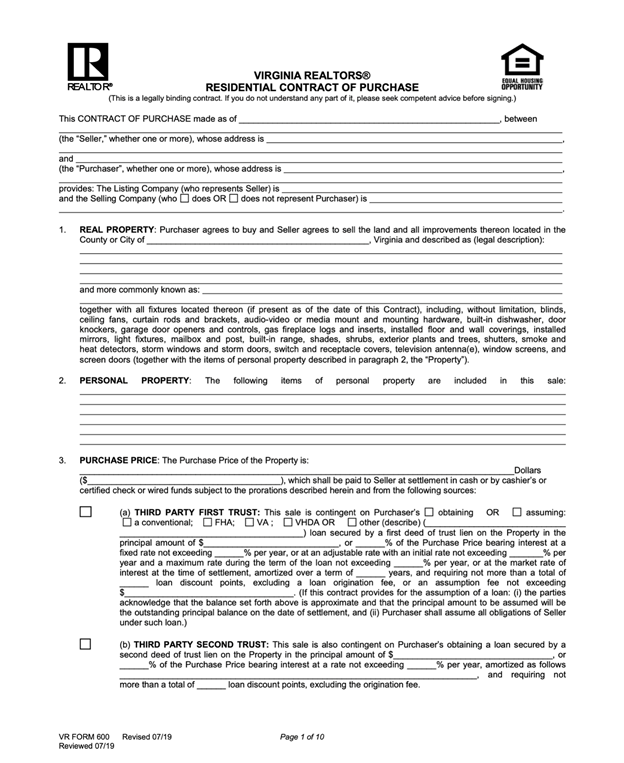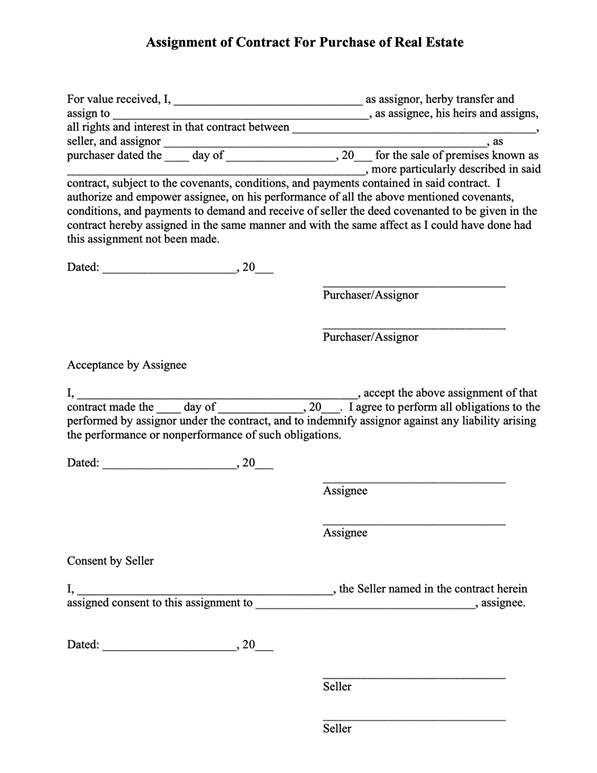
Is Wholesaling Real Estate Legal In Virginia? A 2024 Guide For Investors
Apr 19, 2024
If you’re considering investing in Virginia real estate, you may have already asked yourself the same question as every other aspiring investor: Is wholesaling real estate legal in Virginia? For what it's worth, wholesaling is an attractive exit strategy, but far too many people are held back by its ambiguity. As a result, we've developed this guide to help you navigate the legal wholesaling landscape. In doing so, we'll cover everything there is to know about legally wholesaling in Virginia, starting with the following:
- Essentials For Wholesaling Houses In Virginia
- Is Wholesaling Real Estate Legal In Virginia?
- What Are The Wholesaling Laws In Virginia?
- Do You Need A License To Wholesale Real Estate In Virginia?
- HB 917 & How It Affects Wholesalers In Virginia
- Wholesale Real Estate Contract Virginia
*Before we begin our guide on whether wholesaling properties in Virginia is legal, we invite you to view our video on How To Wholesale Real Estate Step by Step (IN 21 DAYS OR LESS)!
Host and CEO of Real Estate Skills, Alex Martinez, provides a comprehensive, step-by-step guide for beginners to start wholesaling real estate!
Essentials For Wholesaling Houses In Virginia
Officially known as the Commonwealth of Virginia, over 8.6 million people live throughout the state's 42,775 square miles. Some population centers have an extremely high population density, which is worth noting to gauge potential wholesaling opportunities.
Almost half a million people are employed in the tech industry, which is notable because the median household income is $87,249. Additionally, the state's educational system consistently ranks among the top five in the United States. Virginia also has the sixth-highest percentage of residents with bachelor's degrees or higher, nearly 40%. According to USAFacts, "In 2022 (most recent), Gross domestic product (GDP) was $649,392,600,000 in the United States for Virginia (state). This increased by $44,435,000,000 or 7.35% from 2021."
All of these indicators point to a robust and active housing market. For example, according to the most recent Home Sales Report released by Virginia Realtors, supply has been expanding across Virginia, bringing more options to prospective homebuyers. "In March 2024, there were 24,772 homes for sale in Virginia, up 1.2% year over year," according to RedFin. Despite the uptick in inventory, homes are still selling quickly across Virginia. According to Zillow, the median days to pending for a sale is only 12.
All things considered, Virginia's real estate market is firing on all cylinders, which bodes well for local wholesalers. As a result, more and more people are asking the same question: Is wholesaling real estate legal in Virginia?
Real Estate Trade Associations & Governing Bodies
The Virginia Realtors Association represents 36,000 real estate professionals in the state's residential and commercial real estate business. The association protects consumers, represents the interests of property owners, and supports Realtors to ensure ethical and fair behavior when Virginians buy, sell, and own property. Due to its position, the Virginia Realtors Association is a great source for anyone asking, "Is wholesaling real estate legal in Virginia?"
In addition to the Virginia Realtors Association, aspiring wholesalers can also inquire with the following organizations:
- Chesapeake Bay & Rivers (CBRAR)
- Dan River Region (DRRAR)
- Dulles Area (DAAR)
- Fredericksburg Area (FAAR)
- Hampton Roads (HRRA)
- Northern Virginia (NVAR)
- Richmond (RAR)
- Virginia Peninsula (VPAR)
- Williamsburg Area (WAAR)
You can also access all Virginia Local Association Jurisdictions on the Virginia Realtors website.
Under the auspices of the Department of Professional and Occupational Regulation (DPOR), the Virginia Real Estate Board licenses salespersons, brokers, and firms representing others in property transactions. The Board also enforces the state's Fair Housing Law in real estate licensees and employee cases.
As an overview regulatory agency, the DPOR determines which professions and occupations, including licensure or certification, including real estate professionals. These boards establish minimum competency standards that the DPOR enforces.
Some of the most important of these enforcement actions are:
- License Lookup: Verify license status and check the disciplinary history
- Consumer Guides: Educate yourself about working with regulated professions
- News Releases: News you need to know, including recent license revocations
- Virginia Fair Housing Office: Administration of federal and state fair housing laws that protect people from discrimination when trying to rent an apartment, buy a house, obtain a mortgage, or purchase homeowner's insurance.
Is Wholesaling Real Estate Legal In Virginia?
Yes, wholesaling real estate is legal in Virginia. However, you must pay attention to state laws to comply with established regulations. That's why you should educate yourself about the three primary strategies used in wholesaling: the assignment of contract, double closing, and wholetailing.
The most common legal issue where a real estate wholesaler gets into trouble is when they inadvertently broker real estate without a license; this trips up many wholesalers, particularly those who use the contract assignment strategy.
If you're using the assignment of contract method, you must understand that you may only market the rights of a contract to potential buyers after you have secured an agreement with a homeowner. Wholesalers can't market properties for sale, only the rights they receive to buy the subject property.
You often search for distressed properties where motivated sellers face foreclosure. You can't market the home itself if you don't have a real estate license; this is a common problem because the assignment of contract strategy provides the lowest barrier to entry into wholesaling.
There are essentially no costs involved because, as a wholesaler under this type of arrangement, you are not conducting an actual transaction to transfer ownership of a piece of real estate. You enter into a contractual agreement with the homeowner to market the rights to the contract to an eventual end buyer. When the contract is assigned, you collect an assignment fee. You don't collect a commission as you would if you were a licensed real estate professional; this is enticing if you're new to real estate investing and you haven't completed your first deal yet.
A smart wholesaler knows it's in their best interests to understand the laws governing real estate in Virginia as much as possible. An excellent place to grow your education is by picking up a copy of The Virginia Real Estate Manual. Virginia Realtors published this guide, which answers many of the practical and legal considerations a wholesaler may have when starting or growing their business. It is an authoritative and convenient one-stop source of annotated statutes and rules for the Virginia real estate industry. It also includes federal fair housing codes. Not surprisingly, it's a great source for answering the question, "Is wholesaling real estate legal in Virginia?"
Read Also: How To Wholesale Real Estate In Virginia: Step-By-Step
What Are The Wholesaling Laws In Virginia?
While wholesaling real estate is not specifically mentioned in the Virginia legal code, the laws governing real estate sales are contained in the Code of Virginia Title 54.1 Subtitle II Chapter 21. Real Estate Brokers, Sales Persons, and Rental Location Agents.
Part of your job as a wholesaler is to do your due diligence concerning the legalities of putting together a wholesale deal. To start, we suggest you focus on the following statutes.
Professions & Occupations
Title 54.1 governs the conduct of Professions and Occupations. The following chapters specifically govern real estate professionals:
- Chapter 20.1 Real Estate Appraisers (§§ 54.1-2009 through 54.1-2019)
- Chapter 20.2 Real Estate Appraisal Management Companies (§§ 54.1-2020 through 54.1-2023)
- Chapter 21 Real Estate Brokers, Sales Persons, and Rental Location Agents (§§ 54.1-2100 through 54.1-2146)
Property & Conveyances
Title 55.1 deals specifically with Property and Conveyances; this is where wholesaling professionals would do well to spend as much time as needed to understand Virginia's core laws governing real estate investments. Some of the more pertinent things to focus on are:
- Subtitle I. Property Conveyances
- Subtitle II. Real Estate Settlements and Recordation
- Subtitle III. Rental Conveyances
- Subtitle IV. Common Interest Communities
- Subtitle V. Miscellaneous
Disclosures
The Commonwealth of Virginia also enacted The Real Estate Transaction Recovery Act, which provides relief to eligible consumers who have incurred losses through the improper and dishonest conduct of a licensed real estate salesperson, broker, or firm. Filing a claim does not guarantee payment.
As a wholesaler, you must follow laws about disclosures.
Per the Virginia Real Estate Board:
"The Virginia Residential Property Disclosure Act (§ 55.1-700 et seq. of the Code of Virginia) requires the owner of certain residential real property—whenever the property is to be sold or leased with an option to buy—to provide notification to the purchaser of disclosures required by the Act and to advise the purchaser that the disclosures are listed on the Real Estate Board webpage. Certain transfers of residential property are excluded from this requirement (see § 55.1-702)."
As such, all selling homeowners in Virginia complete a Residential Property Disclosures Acknowledgement Form. So, if you're wholesaling and using a double close or wholetailing strategy, you must complete this form.
Sellers must also provide buyers with a Residential Property Disclosure Statement, covered in the Virginia Residential Property Disclosure Act: Title 55.1, Chapter 7 of the Code of Virginia.
Sellers may also need to complete one or more of these forms:
- Septic Waiver Disclosure Form
- Military Air Installation Disclosure Form
- Property Previously Used for Methamphetamine Manufacture Disclosure Form
- Building Code Enforcement Action/Zoning Ordinance Violation Disclosure Form
- Disclosure Statement for Certain New Dwellings
- Privately Owned Stormwater Management Facility Disclosure Form
If you're not sure whether you need to include these forms in the transaction, it might be best to consult an experienced real estate attorney.
If you are involved in flipping a condo unit, take time to review the Condominium Unit Owners' Association Resale Certificate Notice; this document is to be provided with a condominium resale certificate in accordance with §55.1-1990 of the Virginia Condominium Act.
If you're a wholesaler who wants to make some improvements to a property you plan to buy and sell, it's worth reviewing laws governing contractors in Virginia. A good place to start is the Contractor Licensure Consumer Information Sheet.
Two other related regulatory documents published by the Department of Professional and Occupational Regulation that are good to know about are:
- Asbestos Licensing Consumer Information Sheet
- Lead Licensing Consumer Information and Disclosure Sheet
18VAC135-20-280. Improper Brokerage Commission
The following activities by licensees in Virginia could be considered improper brokerage commissions under Virginia law. While this may not directly apply to real estate wholesalers, it highlights payment scenarios that the Real Estate Board doesn't allow.

*For in-depth training on real estate investing, Real Estate Skills offers extensive courses to get you ready to make your first investment. Attend o r FREE training and gain insider knowledge, expert strategies, and essential skills to make the most of every real estate opportunity that comes your way!
Do You Need A License To Wholesale Real Estate In Virginia?
No, you do not need a license to wholesale properties in Virginia. However, many wholesalers get a Virginia real estate license for various reasons.
While a license can provide a measure of protection, it also comes with responsibilities. Getting a salesperson's or broker's license involves a fair amount of work.
The Virginia Real Estate Board licenses real estate salespersons, brokers, and firms. Joining any professional association is voluntary and unrelated to state licensure. State law requires a license to practice real estate but does not require a licensee to be a Realtor.
A Realtor is a licensed real estate agent (salesperson or broker) who is also a member of the National Association of Realtors, a private professional organization.
The multi-step licensing process is as follows:
- Complete pre-license education. For sale persons, this is 60 hours of courses. Brokers are required to complete 180 hours of courses.
- Pass the Virginia and national exams. To learn how to register, download the Candidate Information Bulletin from the Board's vendor, PSI Exams.
- Get your fingerprints taken. Your fingerprints must be taken at a PSI testing location if you live in Virginia. A complete application must be on file with the Board within 45 days, or you will have to get your fingerprints retaken for an additional fee.
- Print, complete, sign, and mail your application.
Virginia has reciprocity agreements with other states. For details, call the Board at 804-367-8526 (Licensing Section) or 804-367-2406 or by email at [email protected].
HB 917 & How It Affects Wholesalers In Virginia
Virginia's real estate wholesaling landscape experienced a shift with the recent introduction of a new piece of legislation: HB 917. This law broadens the definition of a real estate broker to include any “individual or business entity who sells or offers to sell, buys or offers to buy, negotiates, or otherwise deals in real estate contracts, including assignable contracts, on two or more occasions in any 12-month period for compensation or valuable consideration.” According to this new definition, anyone who assigns more than one contract a year must have a broker’s license.
Previously, you could operate as a wholesaler without a license. The typical process involves finding undervalued properties, securing contracts with sellers, and then assigning those contracts to end buyers for a fee. Under HB 917, however, this traditional wholesaling model might require a license if done more than once in 12 months for profit.
Here's where things get interesting: there might be loopholes. Structuring deals as double closings (where two separate closings happen, one between you and the seller, another between you and the end buyer) could be a way to potentially avoid needing a license. However, HB 917 is a new law, and interpretations by courts and regulators are still taking shape.
While wholesaling remains legal, it might require a license for frequent activity. To ensure you're operating within the legal boundaries, it's crucial to consult a Virginia real estate attorney for specific guidance. They can help you understand how HB 917 applies to your specific wholesaling approach and advise you on the best course of action.
Remember, this is a complex legal situation, and it's always best to err on the side of caution. Consulting an attorney will give you peace of mind and help you navigate the new Virginia wholesale landscape effectively.
Wholesale Real Estate Contract Virginia
You'll need to be familiar with two primary contracts as a Virginia wholesaler.
The first is the Virginia REALTORS® Residential Contract of Purchase. Virginia Realtors makes this 10-page fillable purchase agreement available for use and suitable for most residential real estate transactions. Here's an example of what it looks like:

The second document is a standardized contract assignment, which is sometimes used as an addendum to the purchase contract. In other cases, a party to the transaction may prefer a more customized and specific form to assign the contract. A typical assignment contract looks like this.

Suppose you're not experienced or comfortable dealing with real estate investors, cash buyers, or any parts of real estate law. In that case, it's always a good idea to seek legal advice from an experienced real estate attorney.
Final Thoughts
Is wholesaling real estate legal in Virginia? To be clear, it's confirmed that wholesaling is legal in Virginia, provided that you adhere to the specific laws and regulations outlined above. Not only that, but now is an opportune time to learn how to engage in wholesaling effectively. Understanding the legal framework is crucial to your success if you're considering entering this field. Equip yourself with the necessary knowledge and skills today and start capitalizing on the opportunities that wholesaling in Virginia offers.
*Disclosure: Real Estate Skills is not a law firm, and the information contained here does not constitute legal advice. You should consult with an attorney before making any legal conclusions. The information presented here is educational in nature. All investments involve risks, and the past performance of an investment, industry, sector, and/or market does not guarantee future returns or results. Investors are responsible for any investment decision they make. Such decisions should be based on an evaluation of their financial situation, investment objectives, risk tolerance, and liquidity needs








